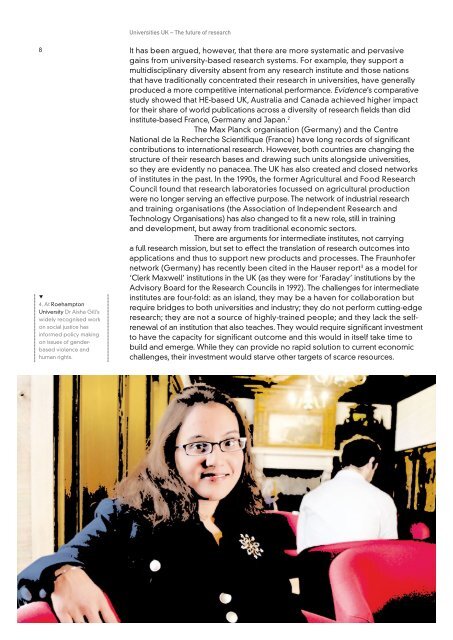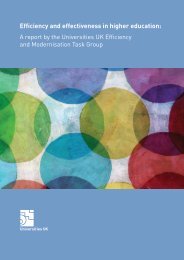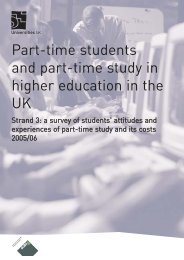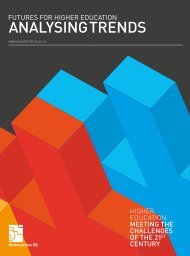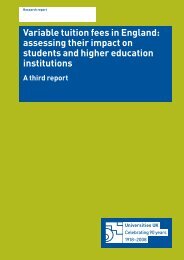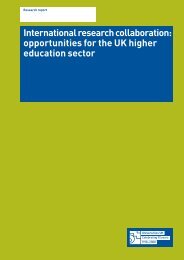The future of research - Universities UK
The future of research - Universities UK
The future of research - Universities UK
Create successful ePaper yourself
Turn your PDF publications into a flip-book with our unique Google optimized e-Paper software.
<strong>Universities</strong> <strong>UK</strong> – <strong>The</strong> <strong>future</strong> <strong>of</strong> <strong>research</strong><br />
8<br />
q<br />
4. At Roehampton<br />
University Dr Aisha Gill’s<br />
widely recognised work<br />
on social justice has<br />
informed policy making<br />
on issues <strong>of</strong> genderbased<br />
violence and<br />
human rights.<br />
It has been argued, however, that there are more systematic and pervasive<br />
gains from university-based <strong>research</strong> systems. For example, they support a<br />
multidisciplinary diversity absent from any <strong>research</strong> institute and those nations<br />
that have traditionally concentrated their <strong>research</strong> in universities, have generally<br />
produced a more competitive international performance. Evidence’s comparative<br />
study showed that HE-based <strong>UK</strong>, Australia and Canada achieved higher impact<br />
for their share <strong>of</strong> world publications across a diversity <strong>of</strong> <strong>research</strong> fields than did<br />
institute-based France, Germany and Japan. 2<br />
<strong>The</strong> Max Planck organisation (Germany) and the Centre<br />
National de la Recherche Scientifique (France) have long records <strong>of</strong> significant<br />
contributions to international <strong>research</strong>. However, both countries are changing the<br />
structure <strong>of</strong> their <strong>research</strong> bases and drawing such units alongside universities,<br />
so they are evidently no panacea. <strong>The</strong> <strong>UK</strong> has also created and closed networks<br />
<strong>of</strong> institutes in the past. In the 1990s, the former Agricultural and Food Research<br />
Council found that <strong>research</strong> laboratories focussed on agricultural production<br />
were no longer serving an effective purpose. <strong>The</strong> network <strong>of</strong> industrial <strong>research</strong><br />
and training organisations (the Association <strong>of</strong> Independent Research and<br />
Technology Organisations) has also changed to fit a new role, still in training<br />
and development, but away from traditional economic sectors.<br />
<strong>The</strong>re are arguments for intermediate institutes, not carrying<br />
a full <strong>research</strong> mission, but set to effect the translation <strong>of</strong> <strong>research</strong> outcomes into<br />
applications and thus to support new products and processes. <strong>The</strong> Fraunh<strong>of</strong>er<br />
network (Germany) has recently been cited in the Hauser report 3 as a model for<br />
‘Clerk Maxwell’ institutions in the <strong>UK</strong> (as they were for ‘Faraday’ institutions by the<br />
Advisory Board for the Research Councils in 1992). <strong>The</strong> challenges for intermediate<br />
institutes are four-fold: as an island, they may be a haven for collaboration but<br />
require bridges to both universities and industry; they do not perform cutting-edge<br />
<strong>research</strong>; they are not a source <strong>of</strong> highly-trained people; and they lack the selfrenewal<br />
<strong>of</strong> an institution that also teaches. <strong>The</strong>y would require significant investment<br />
to have the capacity for significant outcome and this would in itself take time to<br />
build and emerge. While they can provide no rapid solution to current economic<br />
challenges, their investment would starve other targets <strong>of</strong> scarce resources.


